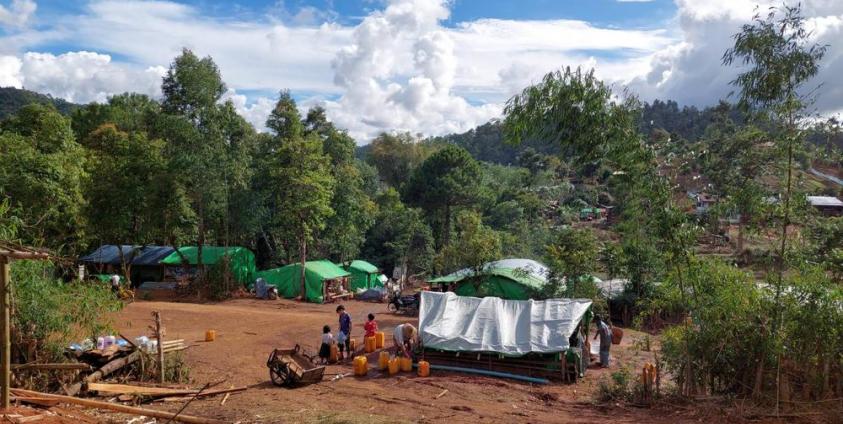The Kayan Women's Organization (KyWo) Co-Secretary-2 Mu Angela, has highlighted the distressing situation in war-affected areas of Karenni (Kayah) State, where the lack of a functioning healthcare system, and insufficient access to medicine, has led to many tragic deaths – especially pregnant women, newborns, and children.
"In the aftermath of the coup, the healthcare system has been decimated, leaving children and mothers without adequate nutrition and medicine. The plight of pregnant women is exacerbated as they are forced to endure displacement amidst ongoing conflict, intensifying the risk of miscarriages. Tragically, there has been a distressing rise in infant mortality following premature births, while the number of maternal deaths after childbirth has surged beyond previous levels”, she said.
As a result of the coup, healthcare centers and hospitals in the region have been forced to close due to various reasons. The situation of temporary clinics established in relief camps for internally displaced people (IDPs) and in rural areas are also experiencing a desperate shortage of medicine. In addition, the inability to provide an adequate supply of nutritional supplements to mothers and children has emerged as a pressing concern, causing great distress, as expressed by Mu Angela.
“Even women fortunate enough to deliver in clinics bear the burden of constant fear, as the looming threat of the Military Council's airstrikes hangs overhead. The profound stress experienced during childbirth can leave its mark on both mother and unborn child, potentially contributing to the alarming rise in miscarriages”, she remarked.
Western Demoso, Hpruso, Pekon, and Mongpai (Mobye) townships bore witness to frequent cases of maternal and infant mortality. In a harrowing incident in January 2023, a woman residing in western Hpruso endured the heartbreak of delivering a stillborn child at just seven months gestation, with the child's body also tragically incomplete.
Furthermore, in the distressing events that unfolded, it was reported that on February 26th, a woman in Lelhtun village, Pekon, suffered a miscarriage at seven months into her pregnancy. Similarly, on March 26th, a tragedy occurred as a woman from Nangpawlong village lost her life during childbirth. The month of March witnessed yet another heart-wrenching incident, with a woman residing in downtown Pekon delivering stillborn twins at seven months gestation, as documented by data compiled by KyWO.
According to Ma Mary, who provides assistance to IDPs in the western region of Demoso Township, at least eight children under the age of two have tragically lost their lives in villages that lack hospitals and clinics, during the two years since the coup. These children did not receive the essential healthcare they needed in a timely manner.
Ma Mary recalls one heartbreaking case. “A child suffered from severe diarrhea, and unfortunately, there was no clinic available in the village. We maintained hope while closely monitoring the child's condition. We had a contingency plan in place, and prepared to transport the child to the nearby town for hospital admission, if there was no improvement within a day or two. Tragically, the child's condition deteriorated further the next day. Despite our swift efforts to rush the child to the hospital, it proved to be too late.”
Although gathering an exact tally of mothers and children who have perished due to inadequate healthcare support is a challenging task. Mu Angela's comment suggests that the number of deaths related to inadequate healthcare in remote and inaccessible areas could potentially be significantly higher than the reported figure.
Furthermore, Mu Angela pointed out that in Karenni State, numerous pregnant women faced transportation problems , which resulted in them relying solely on local midwives for childbirth assistance. Unfortunately, this situation meant that they did not receive the important healthcare support they needed during the process.







